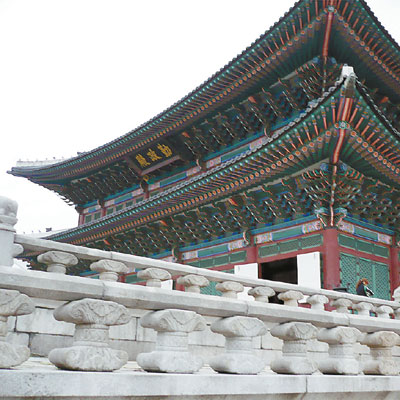
After three and a half hours' flight from Guangzhou, I arrived at Incheon International Airport in Seoul, South Korea, on a September afternoon as a member of a "South China Press Tour" group at the invitation of the Seoul City Government, and started a six-day tour in Seoul.
My first impression of Seoul came from Korean TV series "Daejangum" which touched me with the nation's spirit of perseverance and diversity of delicate and healthy food. The press tour gave me a chance to get a closer look at Daejangum's hometown.
As a major world financial and cultural center, Seoul is considered a global city. The city hosted the 1988 Summer Olympics and the 2002 FIFA World Cup. In 2007, it was listed as the fifth most expensive city in the world and the second most expensive in Asia.
An environmentally friendly city
The cool autumn air refreshed us and indicated that this is the best season to visit Seoul. Seoul is one hour ahead of Beijing in time difference.
During the one-hour bus trip from the airport to the Hilton Hotel in the city center, we passed the Han River, which roughly bisects Seoul into north and south. With stylish skyscrapers here and there and criss-crossed with roads, walking in the streets sometimes gave the illusion of being in Hong Kong. But when a corner of the well-reserved Gyeongbokgung Palace and Changdeokgung Palace, and sometimes traditional Korean-style residences appear, it is surprising that tradition can blend so harmoniously with modernity.
Located in the Han River basin in the country's northwest, Seoul is bordered by mountains and surrounded by five ancient imperial palaces. The other three palaces are Changgyeongung, Deoksugung and Gyeonghuigung, which have a history of around 600 years, all being built in the Joseon Dynasty (1392-1910).
Seoul covers an area of about 605 square kilometers, no more than one-third that of Shenzhen, but has a similar population of about 14 million. However, the traffic was smooth and the air was clear.
According to our tour guides, Wu Zhenzhu and Jin Zhixuan, the city government had spared no efforts in making this heavily populated city a clean and eco-friendly place to live since the 1980s.
There are about 5 million cars in Seoul. However, as the government raised the price of oil in recent years, about 10 yuan per liter, which is almost twice the price in Shenzhen, and raised parking fees in commercial areas, many Seoul residents are using public transport.
Since 1984, the government has been encouraging restaurants and families to use steel chopsticks. To prevent overconsumption and protect environment, the government also raised the cost of garbage bags to about 10 yuan each.
Moreover, an increasing number of hotels are no longer providing disposable products for guests. If you forget to bring toothpaste and a toothbrush, you have to pay a higher price for them.
In tackling vehicle emissions since 2000, the Seoul government has been gradually replacing public buses with non-emission vehicles with compressed natural gas (CNG), a project due for completion by 2010.
According to Oh Se-hoon, mayor of Seoul, 60 percent of the city's buses had so far been replaced with CNG vehicles and the other 40 percent had emission-reducing equipment installed.
In addition, strict limits had been set for government departments and public organizations buying new vehicles. For ordinary citizens, a subsidy of about 7.8 million South Korean won (US$8,000) will be provided for each new vehicle with low emissions.
In recent years, Seoul has made great efforts in the restoration of Cheonggyecheon (清溪川), which has resulted in an amazing 5.8 km sightseeing street dotted with more than 20 bridges.
No doubt, all these measures have contributed to today's clear and clean Seoul.